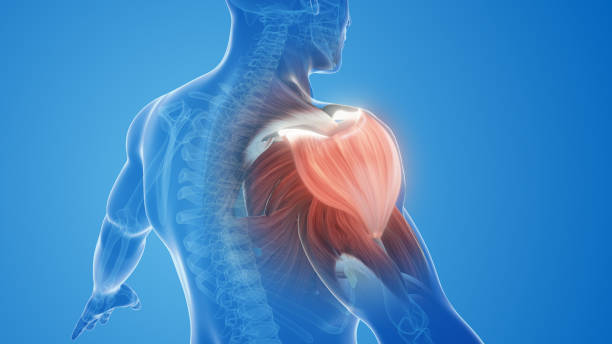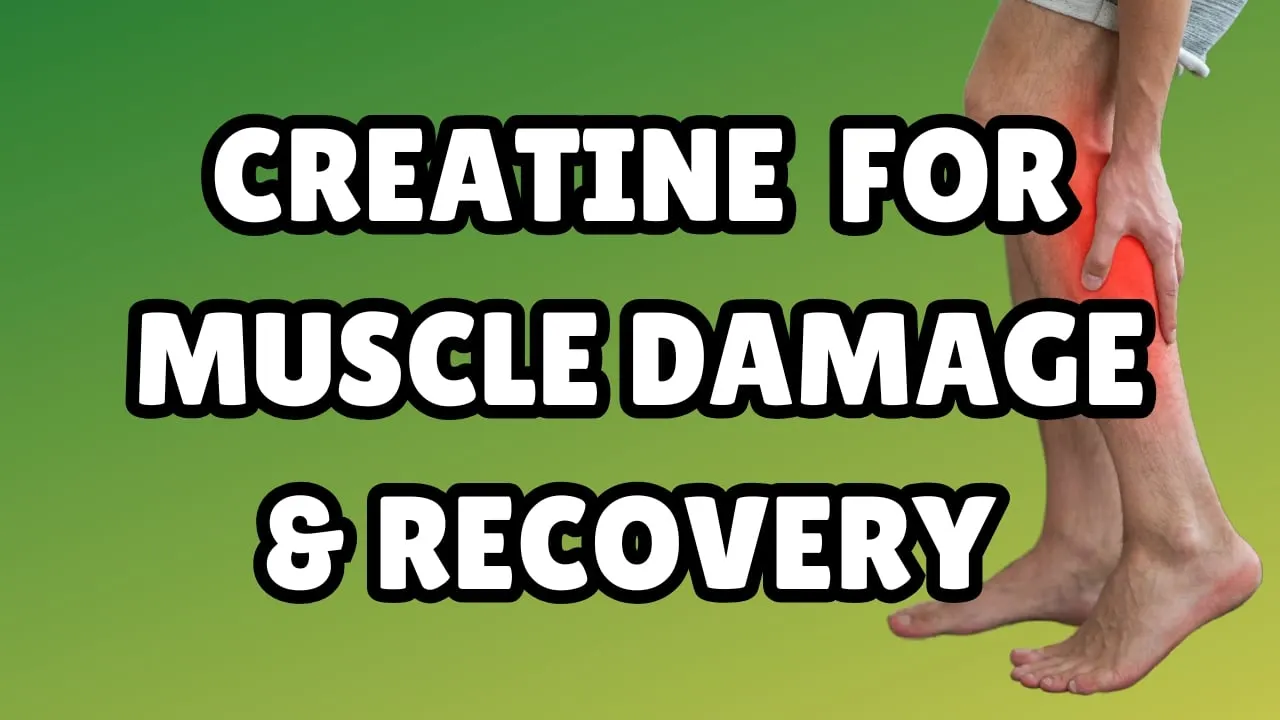Creatine Supplementation: Benefits for Muscle Damage Recovery and Performance
Creatine: The Ultimate Supplement for Muscle Recovery and Damage Prevention
Creatine supplementation has been a hot topic in the fitness world for decades, but its potential benefits extend far beyond just building muscle mass.
In this comprehensive guide, we'll explore how creatine can play a crucial role in preventing and recovering from exercise-induced muscle damage.
Whether you're an elite athlete or a weekend warrior, understanding the impact of creatine on muscle recovery could be the key to enhancing your performance and reducing downtime between workouts.
Read on to discover why creatine might be the missing piece in your fitness puzzle.
![]()
Article Outline
- What is Creatine and How Does It Work?
- Can Creatine Help Prevent Muscle Damage?
- How Does Creatine Supplementation Enhance Muscle Recovery?
- What Are the Benefits of Creatine for Exercise-Induced Muscle Damage?
- Is Creatine Effective in Reducing Delayed Onset Muscle Soreness (DOMS)?
- How Much Creatine Should You Take to Improve Recovery?
- Are There Any Side Effects of Using Creatine for Muscle Recovery?
- Can Creatine Speed Up Muscle Recovery After Intense Workouts?
- What Does Science Say About Creatine and Muscle Force Recovery?
- How Can Athletes Incorporate Creatine into Their Recovery Routine?
1. What is Creatine and How Does It Work?
Creatine is a natural substance found in our muscle cells, playing a crucial role in energy production during high-intensity, short-duration exercises. But what exactly is creatine, and how does it work its magic in our bodies?
Creatine is an amino acid derivative synthesized primarily in the liver, kidneys, and pancreas. It's also found in foods like red meat and fish, though in smaller quantities.
Once in our bodies, creatine combines with phosphate to form creatine phosphate, also known as phosphocreatine. This compound is essential for the rapid regeneration of adenosine triphosphate (ATP), the primary energy currency of our cells.
When we engage in intense physical activities, our muscles quickly deplete their ATP stores. Creatine phosphate steps in to replenish these stores, allowing for sustained high-intensity performance.
This is why creatine supplementation has been shown to enhance muscle strength, power, and overall athletic performance, especially in activities requiring short bursts of intense effort.

2. Can Creatine Help Prevent Muscle Damage?
One of the most intriguing aspects of creatine supplementation is its potential to prevent or mitigate exercise-induced muscle damage. But how exactly does creatine achieve this protective effect?
Research suggests that creatine may help prevent muscle damage through several mechanisms. Firstly, by increasing the energy availability in muscle cells, creatine can help maintain muscle integrity during intense exercise.
This increased energy reserve allows muscles to work more efficiently, potentially reducing the strain and micro-tears that lead to muscle damage.
Moreover, creatine has been shown to have antioxidant properties. During intense exercise, our bodies produce free radicals that can cause oxidative stress and contribute to muscle damage.
Creatine may help neutralize these free radicals, thereby reducing the extent of muscle damage.
Studies have also indicated that creatine supplementation can lead to increased muscle glycogen storage.
Glycogen is a crucial energy source during prolonged exercise, and having higher stores may help delay fatigue and reduce the risk of muscle damage associated with exhaustion.

3. How Does Creatine Supplementation Enhance Muscle Recovery?
Creatine's role in muscle recovery is multifaceted and goes beyond simply preventing damage. Let's delve into how creatine supplementation can enhance the recovery process after strenuous exercise.
Firstly, creatine may help reduce inflammation associated with muscle damage. While some inflammation is necessary for muscle adaptation and growth, excessive inflammation can delay recovery. Studies have shown that creatine supplementation can modulate inflammatory markers, potentially speeding up the recovery process.
Additionally, creatine has been found to enhance muscle protein synthesis. This increased protein turnover can accelerate the repair of damaged muscle fibers, leading to faster recovery times.
By promoting muscle growth and repair, creatine may help athletes bounce back more quickly from intense training sessions.
Creatine supplementation has also been linked to improved glycogen replenishment post-exercise. Faster glycogen resynthesis can contribute to quicker recovery and readiness for subsequent training sessions.
4. What Are the Benefits of Creatine for Exercise-Induced Muscle Damage?
Exercise-induced muscle damage (EIMD) is a common consequence of intense or unaccustomed exercise. The benefits of creatine in mitigating EIMD are numerous and supported by a growing body of research.
One of the primary benefits is the reduction in markers of muscle damage. Studies have shown that individuals supplementing with creatine often exhibit lower levels of creatine kinase, a key indicator of muscle damage, following intense exercise. This suggests that creatine may help maintain muscle membrane integrity during strenuous activities.
Creatine supplementation has also been associated with faster recovery of muscle strength and power following EIMD. This means athletes can return to peak performance more quickly, allowing for more frequent high-intensity training sessions.
Moreover, creatine may help reduce muscle soreness and swelling associated with EIMD. By minimizing these uncomfortable side effects, athletes can maintain a higher quality of training even during intense periods of their program.

5. Is Creatine Effective in Reducing Delayed Onset Muscle Soreness (DOMS)?
Delayed onset muscle soreness (DOMS) is the bane of many athletes' existence, often striking 24-48 hours after an intense workout. But can creatine help alleviate this common issue?
Research on creatine's effect on DOMS has produced mixed results, but several studies suggest that creatine supplementation may indeed help reduce the severity and duration of DOMS. One possible mechanism is creatine's ability to reduce inflammation and oxidative stress, both of which contribute to the development of DOMS.
Additionally, by potentially reducing the extent of initial muscle damage during exercise, creatine may indirectly lead to less severe DOMS. Some athletes report feeling less sore and recovering more quickly when consistently supplementing with creatine.
However, it's important to note that while creatine may help with DOMS, it's not a magic bullet. Proper warm-up, cool-down, and gradual progression in training intensity remain crucial for managing DOMS.
6. How Much Creatine Should You Take to Improve Recovery?
Determining the optimal creatine dosage for improving recovery can be a bit of a balancing act. While more isn't always better, there are generally accepted guidelines for effective creatine supplementation.
The most common and well-researched protocol involves a loading phase followed by a maintenance phase. During the loading phase, which typically lasts 5-7 days, the recommended dosage is 20 g of creatine per day, usually divided into four 5 g doses. This rapidly saturates muscle creatine stores.
After the loading phase, a maintenance dose of 3-5 g per day is generally sufficient to maintain elevated muscle creatine levels. Some research suggests that for larger individuals or those with higher muscle mass, a slightly higher maintenance dose of 5-10 g per day may be beneficial.
It's worth noting that some people choose to skip the loading phase and start directly with the maintenance dose.
While this approach takes longer to fully saturate muscle creatine stores (about 3-4 weeks), it can be equally effective in the long run and may reduce the risk of gastrointestinal discomfort sometimes associated with the loading phase.
7. Are There Any Side Effects of Using Creatine for Muscle Recovery?
Creatine is generally considered safe for most people when used as directed. However, as with any supplement, there are potential side effects to be aware of when using creatine for muscle recovery.
The most commonly reported side effect is water retention, especially during the loading phase. This can lead to a temporary increase in body weight, which usually subsides as the body adjusts to the supplementation.
Some people may experience gastrointestinal discomfort, including bloating, cramping, or diarrhea, particularly when taking large doses. This can often be mitigated by starting with smaller doses and gradually increasing, or by spreading the daily dose across multiple smaller servings.
There have been concerns about creatine's impact on kidney function, but research has consistently shown that creatine supplementation does not negatively affect kidney health in individuals with normal kidney function.
However, those with pre-existing kidney issues should consult a healthcare provider before using creatine.
It's also worth noting that creatine supplementation may increase the body's need for hydration. Ensuring adequate water intake is crucial when using creatine, especially during intense training periods.
8. Can Creatine Speed Up Muscle Recovery After Intense Workouts?
The potential of creatine to speed up muscle recovery after intense workouts is one of its most appealing benefits for athletes and fitness enthusiasts alike. But what does the science say about creatine's ability to accelerate recovery?
Several studies have demonstrated that creatine supplementation can indeed enhance recovery following high-intensity exercise. One mechanism by which creatine may speed up recovery is by reducing exercise-induced muscle damage.
By maintaining the structural integrity of muscle cells during intense activity, creatine may minimize the extent of damage that needs to be repaired post-workout.
Creatine has also been shown to enhance glycogen replenishment in muscles after exercise. Faster glycogen resynthesis can lead to quicker recovery and improved readiness for subsequent training sessions.
Moreover, creatine's role in reducing inflammation and oxidative stress can contribute to faster recovery times. By modulating these factors, creatine may help alleviate post-exercise soreness and stiffness, allowing athletes to return to training more quickly.
It's important to note that while creatine can aid in recovery, it's not a substitute for proper rest, nutrition, and recovery practices. Rather, it should be viewed as a complementary tool in an overall recovery strategy.

9. What Does Science Say About Creatine and Muscle Force Recovery?
The impact of creatine on muscle force recovery after intense exercise has been a subject of significant scientific inquiry. The findings paint an encouraging picture of creatine's potential in this area.
Multiple studies have shown that creatine supplementation can enhance muscle force recovery after eccentrically-induced muscle damage. Eccentric exercises, which involve lengthening the muscle under tension, are known to cause significant muscle damage and strength loss. Research indicates that individuals supplementing with creatine often experience faster recovery of muscle strength and power following such exercises.
One study found that creatine supplementation enhanced muscle force recovery after eccentrically-induced muscle damage in healthy individuals. The creatine group showed significantly better recovery of maximum voluntary contraction strength compared to the placebo group in the days following the damaging exercise.
Another research paper demonstrated that creatine supplementation enhances muscle force recovery after high-intensity exercise. The subjects taking creatine exhibited less strength loss and faster strength recovery compared to those taking a placebo.
These findings suggest that creatine may be particularly beneficial for athletes engaged in sports or training regimens that involve frequent eccentric movements or high-force production.

10. How Can Athletes Incorporate Creatine into Their Recovery Routine?
Incorporating creatine into an athlete's recovery routine can be a game-changer, but it's essential to do it correctly to maximize its benefits.
Here are some strategies for effectively using creatine as part of a comprehensive recovery plan:
- Timing: While the timing of creatine intake isn't as critical as once thought, taking it post-workout may have some advantages. Consuming creatine alongside carbohydrates and protein after exercise can help with nutrient uptake and glycogen replenishment.
- Consistency: Regular, daily supplementation is key to maintaining elevated muscle creatine levels. Aim for a consistent maintenance dose of 3-5 g per day.
- Hydration: Increase water intake when supplementing with creatine to support proper hydration and minimize any potential side effects.
- Combination with other recovery techniques: Use creatine in conjunction with other recovery methods such as proper nutrition, adequate sleep, and active recovery techniques for optimal results.
- Cycling: While not necessary for everyone, some athletes choose to cycle their creatine use (e.g., 8 weeks on, 4 weeks off) to maintain its effectiveness.
- Quality: Choose a high-quality creatine monohydrate from a reputable source. This form of creatine is the most researched and proven effective.
- Individualization: Remember that responses to creatine can vary. Pay attention to how your body responds and adjust your supplementation strategy accordingly.
By thoughtfully incorporating creatine into their recovery routine, athletes can potentially enhance their ability to bounce back from intense training sessions and perform at their best more consistently.
Key Takeaways
- Creatine is a natural compound that plays a crucial role in energy production during high-intensity exercise.
- Creatine supplementation can help prevent exercise-induced muscle damage by increasing energy availability and providing antioxidant effects.
- It enhances muscle recovery by reducing inflammation, promoting protein synthesis, and improving glycogen replenishment.
- Creatine may help reduce the severity and duration of delayed onset muscle soreness (DOMS).
- The typical recommended dosage is a loading phase of 20 g per day for 5-7 days, followed by a maintenance dose of 3-5 g per day.
- Creatine is generally safe, but potential side effects include water retention and gastrointestinal discomfort.
- Scientific studies support creatine's ability to speed up muscle force recovery after intense workouts, particularly following eccentric exercises.
- Athletes can optimize their use of creatine by incorporating it consistently into their recovery routine, ensuring proper hydration, and combining it with other effective recovery strategies.
Remember, while creatine can be a powerful tool for muscle recovery and damage prevention, it should be used as part of a comprehensive approach to training and recovery that includes proper nutrition, adequate rest, and appropriate exercise progression.
Works Cited
- Cleveland Clinic. "Creatine: What It Does, Benefits, Supplements & Safety." Cleveland Clinic. Accessed September 5, 2024. https://my.clevelandclinic.org/health/articles/
- National Library of Medicine. "Creatine Supplementation and Exercise-Induced Muscle Damage: A Mini Review of Underlying Mechanisms." PubMed Central (PMC). Accessed September 5, 2024. https://www.ncbi.nlm.nih.gov/pmc/articles/
- Mayo Clinic. "Creatine: What Is It and What Are the Benefits?" Mayo Clinic. Accessed September 5, 2024. https://www.mayoclinic.org/
For More Training Advice + Diet and Lifestyle visit us Combat Creatine
PS: Make sure you check out the rest of our Training Guides:
Creatine
Creatine Supplements Ultimate Guide
Creatine Supplementation Side Effects
Best Creatine Monohydrate Gummies Review: Top 10 Best Creatine Gummies












